21 March
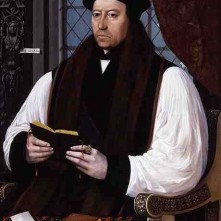
1522 – Death of Christopher Urswick, courtier, diplomat, former confessor and chaplain to Lady Margaret Beaufort, and almoner to Henry VII. His ecclesiastical offices included Dean of York, Canon and Prebendary of St George's Chapel, Windsor and Dean of Windsor. He was also registrar of the Order of the Garter. He died at the rectory of St Augustine's in Hackney, and was buried there.
1540 – Death of John de Vere, 15th Earl of Oxford. He died at Earls Colne in Essex, and was buried at Castle Hedingham on the 12th April. Oxford served Henry VIII as an Esquire of the Body, Lord Great Chamberlain and Royal Councillor. He was also a Knight of the Garter.
1555 – Birth of Sir John Leveson, Kent landowner and Deputy Lieutenant of Kent. In 1601, Leveson helped put down the Earl of Essex's rebellion by commanding men on Ludgate Hill and giving no ground to Essex and his rebels. Essex and his men were forced to withdraw.
1556 - Archbishop Thomas Cranmer was burned at the stake in Oxford for heresy. His execution was a despicable act, in that it was unlawful because Cranmer had actually recanted five times. When he was ordered to make a final recantation on the day of his execution, Cranmer used the opportunity to renounce his recantations and profess his true faith.
1565 – Death of John Warner, Dean of Winchester and physician, at his home in Warwick Lane, London. He was buried at Great Stanmore in Middlesex.
1591 – Death of Edmund Freake, Bishop of Norwich and then of Worcester. He was buried in Worcester Cathedral. In 1579, he tried Matthew Hamont, a Norfolk playwright, for heresy. Hamont was found guilty and burned at Norwich Castle.
1617 – Burial of Pocahontas, the Algonquian Indian princess. Pocahontas was the daughter of Chief Powhatan (Wahunsonac*ck) of the Virginia Algonquian nation. She was renamed Rebecca in 1614 when she was baptised, and she married John Rolfe in Jamestown in April 1614. The couple, and their son Thomas, went to England in 1616. She was ill, probably from pneumonia or tuberculosis, when the family set sail for Virginia in March 1617 and had to be put ashore, where she died. She was buried at St George's in Gravesend, Kent.
22 March
1459 – Birth of Maximilian I, Holy Roman Emperor, at Wiener Neustadt. He was the son of Frederick III, Holy Roman Emperor, and Eleanor of Portugal, and became Holy Roman Emperor in 1493. He was married to Mary of Burgundy, and was the father of Margaret of Austria and Philip I of Castile (Philip the Handsome).
1515 – Death of James Stanley, Bishop of Ely and son of Thomas Stanley, 1st Earl of Derby, at Manchester. He was buried in the Ely Chapel of the collegiate church, which is now Manchester Cathedral. Stanley owed his rise in the Church to his father and his stepmother, Lady Margaret Beaufort, mother of Henry VII.
1519 – Date given for the birth of Katherine Willoughby (married names Brandon and Bertie), Duchess of Suffolk and leading patroness of Reform. She was the daughter of William Willoughby, 11th Baron Willoughby de Eresby, and Lady Maria de Salinas, lady-in-waiting to Catherine of Aragon. She became Charles Brandon's ward in 1529 and married him in 1533.
1580 – Burial of Henry Fitzalan, 12th Earl of Arundel, at Arundel's collegiate chapel.
1582 – Burial of William Bourne, gunner, mathematician and writer, at Gravesend. His works included “Almanacke and Prognostication for iii Yeres”, “A Regiment for the Sea”, “Treasure for Traveilers”, “The Arte of Shooting in Great Ordnance” and “Inventions, or, Devises”.
1599 – Birth of Sir Anthony Van Dyck, painter and etcher, in Antwerp.
23 March
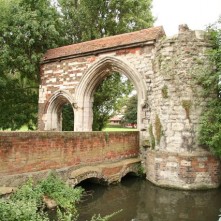
The surviving bridge and gatehouse of Waltham Abbey
1534 - Parliament passed the “First Act of Succession” declaring the validity of Henry VIII and Anne Boleyn's marriage, and recognising the rights of their issue to inherit the throne.
1540 – The Dissolution of Waltham Abbey, the last abbey to be dissolved by Henry VIII.
1596 – Death of Sir Henry Unton (Umpton), soldier, member of Parliament and diplomat in the reign of Elizabeth I. He died after being taken ill with “a violent, burning fever” after accompanying Henry IV of France to the siege at La Fère. His body was returned to England, and he was buried in Faringdon, at All Saints' Church.
1628 – Death of Robert Daborne, playwright. In his later years he took up holy orders and was Dean of Lismore, where he died in 1628. His works included “A Christian Turn'd Turk” and “The Poor Man's Comfort”.
24 March
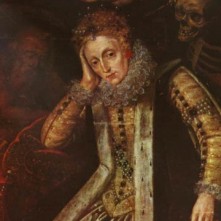
Elizabeth I
1582 – Death of Sir James Dyer, judge, law reporter and Speaker of the House of Commons during the reign of Edward VI. His other offices included King's Sergeant-at-Law, Judge of the Common Pleas and Chief Justice of the Common Pleas. He was buried at Great Staughton Church in Huntingdonshire, next to his wife.
1603 - Death of Queen Elizabeth I at Richmond Palace. She was aged sixty-nine and had ruled for 44 years and 127 days.
1619 – Death of Robert Rich, 1st Earl of Warwick, nobleman and politician, at Warwick House in Holborn. He was buried at Felsted Church. Rich was married to Penelope Devereux, daughter of Walter Devereux, 1st Earl of Essex, and Lettice Knollys, and sister of Robert Devereux, 2nd Earl of Essex. It was not a happy marriage, and the couple separated in 1590 after the birth of their second son, and divorced in 1605. Penelope began a relationship with Charles Blount, the future Lord Mountjoy, in 1590 and went on to have children by him.
25 March
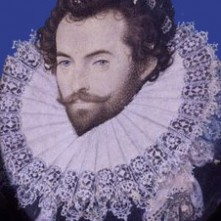
Sir Walter Ralegh
Lady Day, or the Feast of the Annunciation of the Blessed Virgin, and the first day of the calendar year.
1571 – Roberto di Ridolfi left England with a commission to open negotiations to end the trade war, but also with authorisation from Mary, Queen of Scots and the Duke of Norfolk to get Spanish aid for their plot against Elizabeth I.
1584 - Letters patent granted to Walter Ralegh to "discover, search for, fynde out and view... landes, countries and territories", for the benefit of himself, "his heyres and assignes forever."
1586 - Catholic martyr Margaret Clitherow (née Middleton), known as “the Pearl of York”, was pressed to death at the toll-booth on Ouse Bridge in York, under 7 or 8 hundredweight. She was executed for harbouring Catholic priests.
26 March
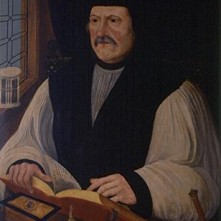
Matthew Parker
1533 – Convocation was asked to pronounce on the validity of a papal dispensation allowing a man to marry his brother’s widow, the man and widow in question being Henry VIII and Catherine of Aragon.
1546 – Death of Sir Thomas Elyot, humanist scholar and diplomat. He was buried at Carleton Parish Church in Cambridgeshire. Elyot's offices included Clerk of the Privy Council, High Sheriff of Oxfordshire and Berkshire, High Sheriff of Cambridgeshire and Huntingdonshire, and a commissioner in the inquiry into the monasteries before their dissolution. He also acted as a diplomat, visiting the court of Charles V in 1531, and was one of the men chosen to receive Anne of Cleves in 1540. Elyot's works include the 1531 treatise “The Boke named the Governour”, the 1536 medical treatise “The Castell of Helth”, his 1538 “Latin Dictionary” and a number of translations.
1556 - Matthew Parker, Archbishop of Canterbury, and Edmund Grindal, Bishop of London, summoned one hundred and ten ministers to Lambeth Palace to get them to pledge their willingness to wear vestments, as worn by the man in front of them: Robert Cole, a former non-conformist who now complied. The outfit consisted of a square cap, gown, tippet, and surplice. They were also asked “to inviolably observe the rubric of the Book of Common Prayer, and the queen's majesty's injunctions, and the Book of Convocation” and to commit to these orders on the spot, by writing “volo” or “no volo”. 37 refused and were suspended.
1609 – Date of death for John Dee, astrologer, mathematician, alchemist, antiquary, spy, philosopher, geographer and adviser to Elizabeth I, given by John Pontois, a merchant who inherited some of Dee's books. This date was backed up by Anthony Wood, who told Elias Ashmole that Dee had died at Pontois' house in Bishopsgate Street. Dee was buried in Mortlake Church. The traditional date for Dee's death is December 1608.
1618 – Death of John Bridges, Dean of Salisbury in Elizabeth I's reign and Bishop of Oxford in James I's reign, at Marsh Baldon, Oxfordshire. He was buried there.
27 March
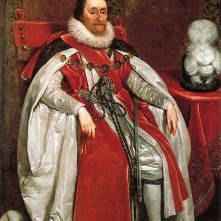
James I
1489 - The Treaty of Medina del Campo was signed between England and Spain. One part of it was the arrangement of the marriage between Arthur, Prince of Wales, and Catherine (or Catalina) of Aragon. It was signed by Spain on this day and ratified in 1490 by Henry VII.
1539 – Burial of George Talbot, 4th Earl of Shrewsbury, at St Peter's Church, Sheffield. He is known for his loyalty to the King during the Pilgrimage of Grace uprisings, which was seen as crucial to the failure of the rebellion. His offices under Henry VIII included Chamberlain of the Exchequer, Lieutenant of the Vanguard in the 1513 French campaign and Lieutenant-General in 1522 in the Scottish borders.
1555 – Burning of William Hunter, Protestant martyr. Nineteen year-old Hunter got into trouble when he was found reading the Bible in Brentwood Chapel. The plaque at the spot where he was burned reads:
"WILLIAM HUNTER. MARTYR. Committed to the Flames March 26th MDLV.
Christian Reader, learn from his example to value the privilege of an open Bible. And be careful to maintain it."
1563 – Death of Richard Pallady, member of Parliament and member of the household of Edward Seymour, Duke of Somerset and Lord Protector.
1599 – Robert Devereux, Earl of Essex, left London for Ireland as Lieutenant General.
1604 – Funeral of John Whitgift, Archbishop of Canterbury, at St Nicholas Chapel, Croydon Minster.
1620 – Death of Edward Lister, Physician-in-Ordinary to Elizabeth I and James I, in Aldermanbury in London. He was buried at St Mary's Church in Aldermanbury.
1625 – Death of James I at Theobalds, Hertfordshire. He was laid to rest in the Henry VII Chapel, Westminster Abbey on 5th May. John Donne gave the funeral sermon. James had been suffering with ill health for a few months, having kidney problems and attacks of arthritis and gout, followed by tertian ague and a stroke. It seems that he died during a severe attack of dysentery. He was succeeded by his son, Charles I.



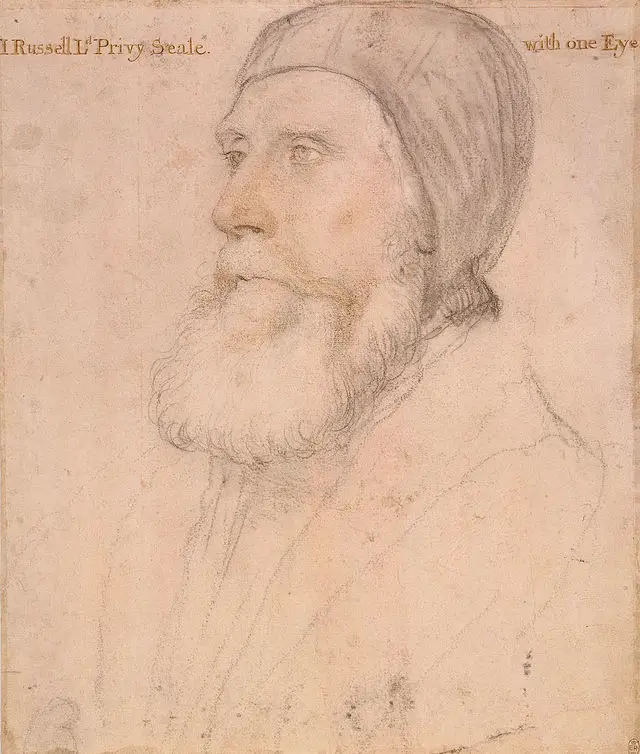
Leave a Reply